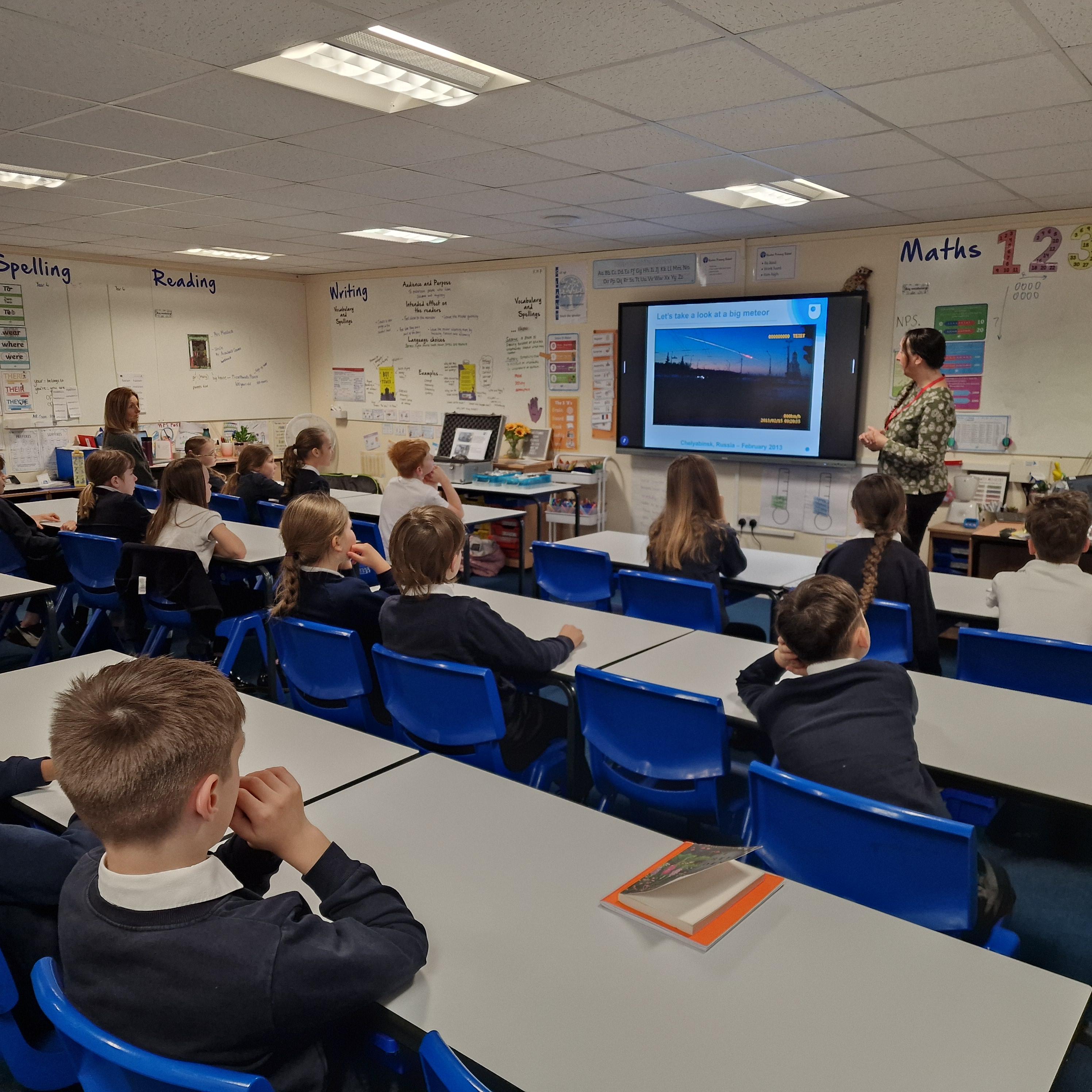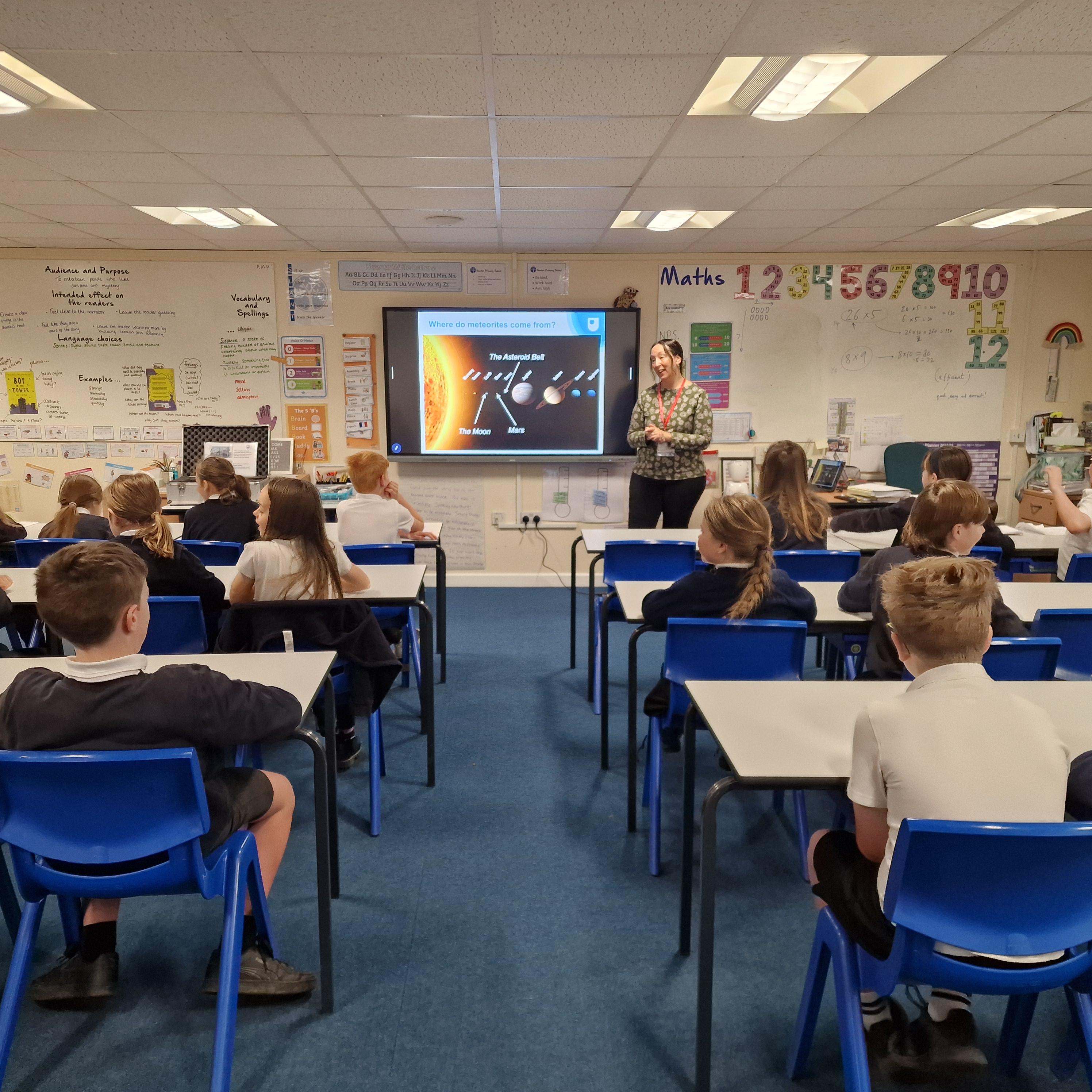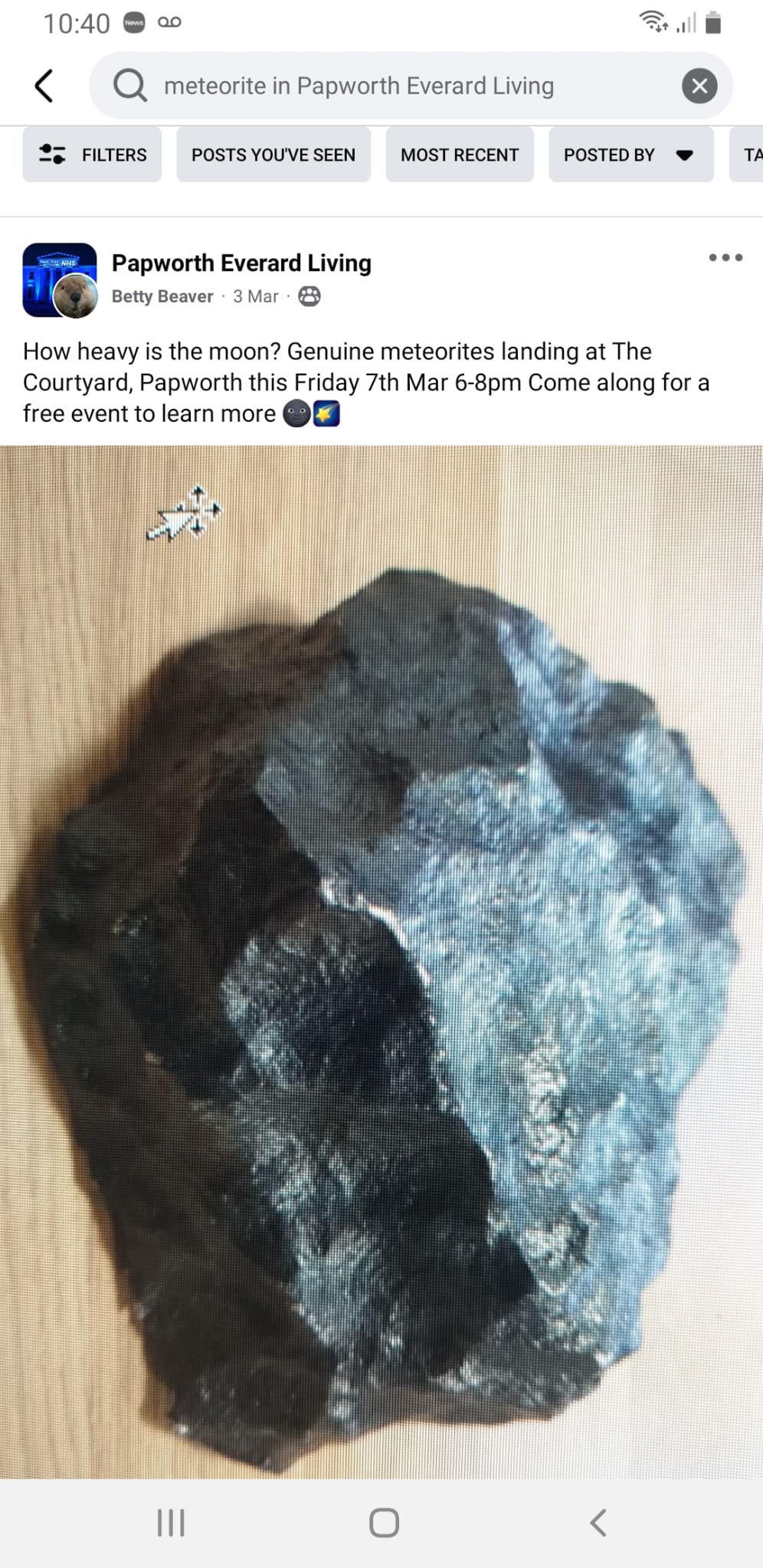Submitted by admin on
In March 2025, during British Science Week, Dr. Diane Turner embarked on an outreach tour across Cambridgeshire to showcase pieces from one of space science’s most fascinating subjects, meteorites. These extraordinary rocks, which survive the intense heat of entry through Earth’s atmosphere and land on our planet's surface, offer a considerable link to the early solar system.
.png)
Meteorites come in three main types, stones, stony-irons, and irons and are further classified into primitive and processed groups. Primitive meteorites are particularly valuable to scientists because they retain the chemical makeup of the solar nebula, the cloud of gas and dust from which our Solar System formed over 4.5 billion years ago. Processed meteorites, on the other hand, originate from larger, differentiated bodies such as asteroids or even planetary crusts and cores, providing rare insights into planetary geology.
Although they can resemble ordinary rocks, meteorites often bear a distinctive dark, fusion crust formed during their high-speed journey through Earth’s atmosphere. Some are rich in metal, especially nickel-iron, which makes them magnetic and slightly easier to identify in the field.
The Open University in Milton Keynes, houses one of the UK’s most significant collections, comprising around 50,000 meteorite samples.
We spoke with several colleges and community centres that hosted Dr. Diane Turner to hear about their recent experiences engaging with real meteorite samples up close.
Swavesey Village College
This Science Week, all Year 8 students at Swavesey Village College enjoyed a unique opportunity – the chance to touch and hold meteorites from space, including pieces of the moon and Mars!
Swavesey was lucky enough to host Dr Diane Turner in all our Year 8 classes where students were able to hold a chunk of the Gibeon meteorite made of iron and weighing 8kg, as well as rocks from the moon, Mars and many more meteorites discovered all over the world. The students thoroughly enjoyed the chance to get hands on with this subject, which is usually difficult to get involved with in more than pictures and videos online.
Dr Turner also gave the students an introductory talk about meteorites, including where they come from, where they’re found and some of the more interesting stories linked to some of them – who knew that most meteorites are found in Antarctica?! Dr Turner linked careers including astronomy and chemistry into the presentation and meteorite experience, giving our students science capital to help them link STEM into their developing ideas about the world and their own futures.
The students also had the chance to work on a space themed science projects which were presented to their peers. This was a great opportunity to build independence, teamwork and presenting skills. Some projects were directly inspired by the experience with Dr Turner and the meteorites.
Many thanks to both Dr Tuner and The Open University for this possibly once in a lifetime experience.



Comberton Village College
Diane came and spoke to a selection of staff and students during Science Week. There was lots of interest with staff and students alike keen to get their hands on the meteorites.
A teacher said: “I found the presentation engaging and informative. While I'd hoped for an opportunity to get a closer look at some meteorite samples, I never imagined I'd get to hold a fragment of Mars in my hand, having only been admiring its distant light in the night sky the previous evening: amazing!”
A year 7 student said: "I found it incredibly intellectual, knowledgeable, and helped me learn more about space. I had never dreamed of holding some of those amazing specimens! Like one of them was super dense and really hard to pick up for its size, and another was a piece of the moon...or, should I say, a piece of the Earth that has been away for a while. It inspired me to set up my telescope!"
A year 11 student told me it had been his favourite science club session of the year.
We look forward to welcoming Diane back next year.

Day Centre Papworth
On The 11th March we were delighted to have a fascinating talk by Dr Diane Turner PhD FRSC who told us lots of interesting facts about meteorites and passed around meteorites for us all to examine.
Dr Diane Turner is the Director and Senior Consultant at Anthias Consulting Ltd., an analytical chemistry training and consultancy company based in Papworth and a Visiting Fellow at The Open University, working with research groups in the School of Physical Sciences which includes the Outreach meteorite collection.
Diane presented the outreach meteorite collection which includes Nakhla (from Mars), a meteorite from the moon, along with other stony, stony iron and iron meteorites, impact glass, a Tektite (a piece of Earth that has been flung up into space and then returned) and a carbonaceous chondrite containing particles older than our solar system. Gibeon is an iron meteorite and the piece in the outreach collection weighs 8kg! As the meteorites were passed around they prompted much discussion and curiosity. Many thanks to Diane for a very interesting morning.
Newton Primary School
Dr Diane was excellent! The children were fascinated by the talk and responded brilliantly to being able to hold, examine and pass round the items! They could not BELIEVE they were holding a piece of the moon!
The children had some great questions and Diane answered them really well, especially including lots of visuals and videos to support what she was teaching us. Thank you for a fabulous presentation!
Dr. Diane was a fabulous addition to celebrating British science week at Newton Primary School. The children were very excited when she opened her big case full of meteorites! The presentation was well thought out, and each class found the presentation targeted the audience at an age-appropriate level. The children were very engaged and absolutely loved holding actual meteorites and a piece of the moon! They couldn't wait to go home and tell their families. All round, a very informative and enjoyable experience.
Thank you so much for taking the time to come and visit our school.


The Courtyard Papworth Everard
Diane Turner attended a local, public event, at the Papworth Everard Courtyard Cafe in March. The staff and the local community were excited to have Diane present the Meteorites and have the opportunity to hold a piece of the Moon, Mars, and much more. The staff said it was a great atmosphere to have in the cafe and look forward to welcoming Diane back again soon.
"We had a great time. My girl was so interested. She loves all things to do with space. Thank you!" - One parent who attended the public event.

- Log in to post comments
